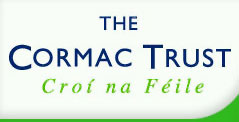Sudden Death Due to Heart Defect
Local mothers who lost their healthy young sons because of heart problems, have called for immediate enquiries into the increase in the number of sudden deaths.
Tyrone star, Cormac McAnallen’s mother Bridget has called for a full investigation by medical authorities into sudden cardiac deaths involving fit young players.
And a Castlederg mother, whose 19-year-old son collapsed and died four years ago, said there needs to be a full investigation into congenital heart disease which is robbing families unnecessarily.
Helena McElhill said her son Proinnsias died from a rare condition known as Wollffs Parkinson White (WPW) – a rare disease which could have been detected had proper ECHO screening been carried out. According to Mrs McElhill, there are up to six deaths each week in Britain from sudden cardiac death – a startling fact which is not fully understood here.
A month on from the death of her son Cormac, Bridget McAnallen has broken her silence to speak following the death of Armagh rugby star John McCall who died during a rugby game in South Africa at the weekend.
The death of Cormac McAnallen, at the age of 24, was due to a viral heart problem. Mrs McAnallen asked: “How can this happen twice in such a short period of time?”
The grieving mother said the issue of inexplicable heart deaths involving sportsmen should be examined to see if they were linked to training levels.
“It seems to contradict the whole idea of training. Cormac had a very low heart rate which seems to indicate a very strong healthy heart, and if his death had anything to do with his heart then it is very hard to believe,” she added.
The similarities between the deaths of the sporting stars and her son prompted Helena McElhill to tell the story of how she tried to make sense of the fact that her healthy youngest son told her his heart was beating fast and within two hours he was dead.
Helena said Proinnsias’s post mortem at first seemed to be inconclusive, but after tissue samples were sent to an expert in England, the cause of death was found to be WPW syndrome.
Proinnsias was not involved in sport in any way. In the following years, Helena and her husband Joe had to educate themselves on the quite complex area of sudden heart disease.
They consulted CRY, which is a support group linked to Cardiac Risk in the Young which has quite comprehensive details on the various diseases.
CRY was founded in 1995 in a home in Surrey and the charity later moved to its own offices. The aims of the charity is to raise awareness of cardiac risk in the young and sudden death syndrome. One of its many achievements was to set up a CRY Centre of Sports Cardiology based at the British Olympic Medical Centre – the first specialist centre dedicated to the cardiac evaluation of athletes in the world.
The charity also supports medical research into sudden cardiac death. It has donated £400,000 worth of cardiac equipment for use in GP surgeries, cardiac wards and A&E departments.
The goal of the charity is to raise awareness about the risk of sudden cardiac death and hopefully raise awareness in the medical world for better screening of young people potentially at risk, especially those involved in sport. The CRY website can be accessed at www.c-r-y.org.uk
Dr Clive Russell, Physician at the Tyrone County Hospital, said the deaths of the young people were a major tragedy for the families and the people of Tyrone.
He said that the WPW syndrome was not a rare condition. “There are millions of people who have WPW syndrome but only a very few become ill with it,” he explained.
Mr Russell felt that screening through electrocardiogram (ECG) would not be very effective and that echocardiograms would be better. However resources would need to be increased if this type of service was to be provided in hospitals across the country. “ECHOs take 20 minutes to do and need trained technical staff to operate and write reports. ECGs take just a few minutes to carry out but the results are not as comprehensive”
Omagh born cardiologist, Dr Paul McGlinchey, who is registrar in cardiology at the Royal Victoria Hospital, is conducting research into heart disease.
He agreed that there are a large number of heart conditions which display different symptoms and which are treated differently.
He said he was surprised to learn recently that players who play at All-Ireland level do not undergo any specialist medical examination.
“Most of these players are not instructed to go to their GPs other than when they are sick. I would think that for someone performing at that level of sport they should be having a fairly basic investigation in the form of an ECG or ECHO” said Dr McGlinchey.
Rosetta Donnelly, The Ulster Herald.


